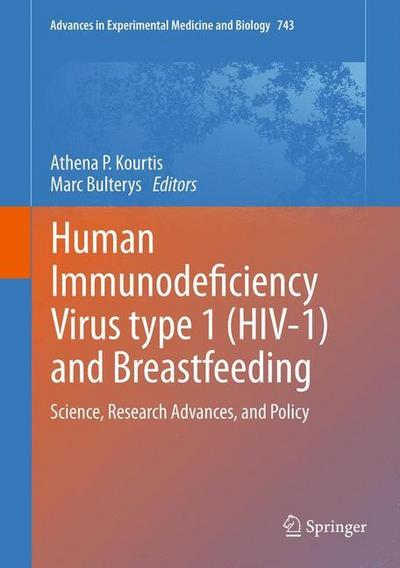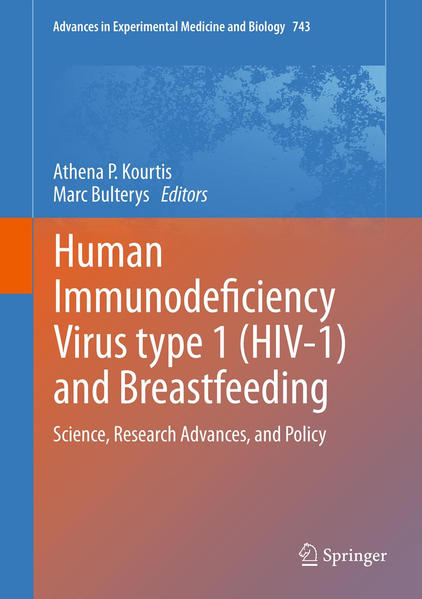
Human Immunodeficiency Virus type 1 (HIV-1) and Breastfeeding : Science, Research Advances, and Policy - edition reliée, livre de poche
2012, ISBN: 1461422507
[EAN: 9781461422501], Neubuch, [SC: 0.0], [PU: Springer New York], EPIDEMIOLOGIE; GESUNDHEITSWESEN; IMMUNSYSTEM - IMMUNOLOGIE IMMUN AUTOIMMUNITÄT; INFEKTIOLOGIE; MATERNALANDCHILDHEALTH; I… Plus…
| ZVAB.com AHA-BUCH GmbH, Einbeck, Germany [51283250] [Rating: 5 (von 5)] NEW BOOK. Frais d'envoiVersandkostenfrei. (EUR 0.00) Details... |

2009, ISBN: 9781461422501
[ED: Buch], [PU: Springer New York], Neuware - The HIV pandemic continues to levy a heavy burden on the human race world-wide. The estimated number of people who became newly infected wit… Plus…
| booklooker.de |

2012, ISBN: 1461422507
The HIV pandemic continues to levy a heavy burden on the human race world-wide. The estimated number of people who became newly infected with HIV in 2009 was 2.6 million; most of these in… Plus…
| Weltbild.de Nr. 33678385. Frais d'envoi, 2-5 Werktage, DE. (EUR 0.00) Details... |

Human Immunodeficiency Virus type 1 (HIV-1) and Breastfeeding Science, Research Advances, and Policy - livre d'occasion
2012, ISBN: 9781461422501
[PU: Springer US], Buchschnitt verkürzt - gepflegter, sauberer Zustand 11556443/12, DE, [SC: 3.00], gebraucht; sehr gut, gewerbliches Angebot, 2012, Banküberweisung, Kreditkarte, PayPal, … Plus…
| booklooker.de |

Human Immunodeficiency Virus type 1 (HIV-1) and Breastfeeding Science, Research Advances, and Policy - livre d'occasion
2012, ISBN: 9781461422501
[PU: Springer US], Buchschnitt verkürzt - gepflegter, sauberer Zustand 11556443/12, DE, [SC: 3.00], gebraucht; sehr gut, gewerbliches Angebot, 2012, Banküberweisung, Kreditkarte, PayPal, … Plus…
| booklooker.de |


Human Immunodeficiency Virus type 1 (HIV-1) and Breastfeeding : Science, Research Advances, and Policy - edition reliée, livre de poche
2012, ISBN: 1461422507
[EAN: 9781461422501], Neubuch, [SC: 0.0], [PU: Springer New York], EPIDEMIOLOGIE; GESUNDHEITSWESEN; IMMUNSYSTEM - IMMUNOLOGIE IMMUN AUTOIMMUNITÄT; INFEKTIOLOGIE; MATERNALANDCHILDHEALTH; I… Plus…

2009, ISBN: 9781461422501
[ED: Buch], [PU: Springer New York], Neuware - The HIV pandemic continues to levy a heavy burden on the human race world-wide. The estimated number of people who became newly infected wit… Plus…

2012
ISBN: 1461422507
The HIV pandemic continues to levy a heavy burden on the human race world-wide. The estimated number of people who became newly infected with HIV in 2009 was 2.6 million; most of these in… Plus…

Human Immunodeficiency Virus type 1 (HIV-1) and Breastfeeding Science, Research Advances, and Policy - livre d'occasion
2012, ISBN: 9781461422501
[PU: Springer US], Buchschnitt verkürzt - gepflegter, sauberer Zustand 11556443/12, DE, [SC: 3.00], gebraucht; sehr gut, gewerbliches Angebot, 2012, Banküberweisung, Kreditkarte, PayPal, … Plus…

Human Immunodeficiency Virus type 1 (HIV-1) and Breastfeeding Science, Research Advances, and Policy - livre d'occasion
2012, ISBN: 9781461422501
[PU: Springer US], Buchschnitt verkürzt - gepflegter, sauberer Zustand 11556443/12, DE, [SC: 3.00], gebraucht; sehr gut, gewerbliches Angebot, 2012, Banküberweisung, Kreditkarte, PayPal, … Plus…
Données bibliographiques du meilleur livre correspondant
Informations détaillées sur le livre - Human Immunodeficiency Virus type 1 (HIV-1) and Breastfeeding: Science, Research Advances, and Policy (Advances in Experimental Medicine and Biology, 743, Band 743)
EAN (ISBN-13): 9781461422501
ISBN (ISBN-10): 1461422507
Version reliée
Date de parution: 2012
Editeur: Kourtis, Athena P. Bulterys, Marc, Springer
315 Pages
Poids: 0,786 kg
Langue: Englisch
Livre dans la base de données depuis 2007-05-02T14:10:46+02:00 (Zurich)
Page de détail modifiée en dernier sur 2024-01-29T09:40:21+01:00 (Zurich)
ISBN/EAN: 1461422507
ISBN - Autres types d'écriture:
1-4614-2250-7, 978-1-4614-2250-1
Autres types d'écriture et termes associés:
Auteur du livre: bul
Titre du livre: human, die type, athena, hiv, virus wahn
Données de l'éditeur
Auteur: Athena P. Kourtis; Marc Bulterys
Titre: Advances in Experimental Medicine and Biology; Human Immunodeficiency Virus type 1 (HIV-1) and Breastfeeding - Science, Research Advances, and Policy
Editeur: Springer; Springer US
315 Pages
Date de parution: 2012-03-28
New York; NY; US
Imprimé / Fabriqué en
Langue: Anglais
160,49 € (DE)
164,99 € (AT)
177,00 CHF (CH)
POD
XVII, 315 p.
BB; Hardcover, Softcover / Medizin/Allgemeines; Medizin, allgemein; Verstehen; maternal and child health; infectious diseases; Health Sciences; Epidemiology; Gynecology; Diseases; Virology; Immunology; Epidemiologie und medizinische Statistik; Gynäkologie und Geburtshilfe; Krankheiten und Störungen; Mikrobiologie (nicht-medizinisch); Immunologie; EA; BC
The HIV pandemic continues to levy a heavy burden on the human race world-wide. The estimated number of people who became newly infected with HIV in 2009 was 2.6 million; most of these individuals live in Sub-Saharan Africa, followed by India and Southeast Asia. An estimated 370,000 new cases of pediatric infections occurred globally in 2009 (or more than 1,000 new infections every day), practically all of them through mother-to-child transmission. Up to 40% of all new infant HIV infections occur during breastfeeding. While breastfeeding by HIV-infected mothers is not recommended in the U.S. and other resource-rich settings where safe replacement feeding is easily available, the situation is different in many resource-limited settings, where replacement feeding is not safe or available and carries a high risk of infections (diarrhea, pneumonia) and infant malnutrition. Mothers in such settings are faced with a difficult dilemma: to breastfeed their infants in order to provide theirinfants with its many benefits (nutritional, immunologic, cognitive), but to also risk transmitting HIV. These challenges have prompted an intensive search for new prophylactic and therapeutic strategies in order to prevent infants from acquiring HIV infection through breastfeeding.
In this book, expert HIV researchers critically review every aspect of this highly evolving and topical subject. The opening chapters deal with the epidemiology, global magnitude and biologic mechanisms of HIV-1 transmission from mother to child through breastfeeding and include considerations of the virus (quantity, compartments, characteristics) and the host (genetic, immunity-innate, cellular, humoral). The effects of breastfeeding on the HIV-infected mother’s health and nutritional status, and the social and cultural issues associated with the practice of breastfeeding are also discussed. The next few chapters provide cutting-edge reviews of the latest approaches to prevention of HIV transmission to the infant through breastfeeding, including antiretroviral strategies, nutritional and immune-based approaches, and treatment of expressed breast milk. The remaining chapters provide a fascinating review of the many iterations this subject has received, as reflected in the several different sets of guidelines for infant feeding by HIV-infected mothers issued by the World Health Organization, and a debate by leading scientists on whether HIV-infected mothers should breastfeed their infants-in resource-limited and in resource-rich settings. A comprehensive overview of the current state of implementing the new evidence for prevention of breastfeeding transmission of HIV all over the world is also presented.
Essential reading for the many disciplines of scientists and clinicians working on HIV/AIDS and other retroviruses, pediatricians, obstetricians/gynecologists, as well as all health-care professionals interested in expanding their understanding on the subject.
Breastfeeding and transmission of HIV-1: Epidemiology and Global Magnitude.- Breastfeeding and Transmission of viruses other than HIV-1.- Breastfeeding among HIV-1-infected women: Maternal health outcomes and social repercussions.- Virologic determinants of breast milk transmission of HIV-1.- HIV-1 resistance to antiretroviral agents: Relevance to mothers and infants in the breastfeeding setting.- Animal models of HIV transmission through breastfeeding and pediatric HIV infection.- Antiretroviral pharmacology in breast milk.- HIV-1 diagnosis of the breastfed infant.- The immune system of breast milk: antimicrobial and anti-inflammatory properties.- Humoral /mucosal/innate immunity in the breast milk in the context of HIV-1 infection.- Cellular immunity in breast milk: Implications for Postnatal Transmission of HIV-1 to the infant.- Antiretroviral drugs during breastfeeding for the prevention of postnatal transmission of HIV-1.- Immune Approaches for the prevention of breast milktransmission of HIV-1.- Non-antiretroviral approaches to prevention of breast milk transmission of HIV-1: Exclusive breastfeeding, early weaning, treatment of expressed breast milk.- Breast milk micronutrients and mother-to-child transmission of HIV-1.- Historical perspective of African-based research on HIV-1 transmission through breastfeeding: The Malawi experience.- Breastfeeding and HIV infection in China.- The role of the President’s Emergency Plan for AIDS Relief (PEPFAR) in infant and young child feeding guideline development and program implementation.- Should women with HIV-1 infection breastfeed their infants? Balancing the scientific evidence, ethical issues and costs-policy considerations.- HIV-1 and Breastfeeding in the United States.- Epilogue. The future of breastfeeding in the face of HIV-1 infection: Science and Policy.From the reviews:
Presents the scope of HIV transmission from mother to infant through breast milk Includes new discoveries of mucosal and innate immunity Gives a current look at international research that attempts to balance HIV transmission prevention with retaining breast milk’s nutritional and immunologic benefits
Autres livres qui pourraient ressembler au livre recherché:
Dernier livre similaire:
9781493952786 Human Immunodeficiency Virus type 1 (HIV-1) and Breastfeeding: Science, Research Advances, and Policy Athena P. Kourtis Editor (Athena P. Kourtis; Marc Bulterys)
- 9781493952786 Human Immunodeficiency Virus type 1 (HIV-1) and Breastfeeding: Science, Research Advances, and Policy Athena P. Kourtis Editor (Athena P. Kourtis; Marc Bulterys)
- 9781461422518 Human Immunodeficiency Virus type 1 (HIV-1) and Breastfeeding (Athena P. Kourtis; Marc Bulterys)
- Human Immunodeficiency Virus type 1 (HIV-1) and Breastfeeding
< pour archiver...
